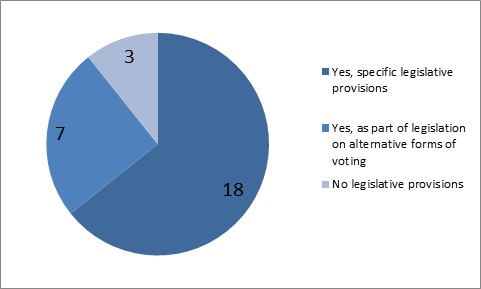Is there legislation in place regulating how people living in long-term institutions may vote?
Although Article 19 of the CRPD sets out the right to live in the community, many people with disabilities live in long-term institutions. The CRPD is clear that people with disabilities enjoy rights on an equal basis with others, regardless of where they live. However, living in an institution can present particular problems in exercising the right to vote: reaching a polling station can be difficult, for example, because some institutions are located in remote areas, there is a lack of available or accessible transport, or residents are not able to leave the institution without assistance.
Legislative provisions to ensure that persons living in institutions can exercise their right to vote can involve providing for alternative forms of voting, or setting up voting booths at institutions or allowing mobile ballot boxes which can be brought to institutions. Such measures should take into account the importance of guaranteeing the secrecy of the vote and ensuring that persons with disabilities can make a free choice of candidate or party to support without undue influence from others.
Is there legislation in EU Member States regulating how people living in long-term institutions may vote?

Source: FRA, 2014
Specific legislation regulating how persons living in long-term institutions may vote is in place in 18 EU Member States. Such legislation can take a number of different forms. In Austria, Bulgaria, Finland, France, Germany and Poland, for example, the law provides for polling stations to be set up at long-term institutions, although in Italy an institution must have at least 200 beds before a polling station can be opened.
Hungary, Latvia, Lithuania, Slovenia and Slovakia also provide for polling stations at long-term institutions, but require an individual application or notification to use such a polling station in advance, which could act as a barrier to exercising the right to vote. In Croatia, the government assigns polling stations for people living long term in institutions. For the 2013 European parliamentary elections, polling stations were assigned for 13 institutions, selected out of 253 long-term institutions due to their remote location and other circumstances that would prevent persons with disabilities from voting at regular polling stations.
In Denmark, Luxembourg, the Netherlands, Romania, Spain, Sweden and the United Kingdom provisions regarding the voting of persons living in long-term institutions are part of general measures on alternative forms of voting. Mobile polling stations are not provided for in these countries, except in Romania where a mobile ballot box may be provided for national elections if a person requests it with medical proof that he or she cannot be transported to a polling station. The request must be approved by the president of the election bureau in the voting district.
In Belgium, Cyprus, and Greece, the analysis indicated that there is no legislation setting out how people living long term in institutions can exercise the right to vote.